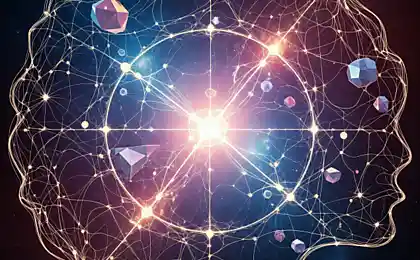1744
4 myths that form the frame of the trap of happiness
We all need him. We all crave it. We all try to achieve. But what exactly is this elusive goal that we all rush?

The word "happiness" has two very different meanings.
1. As a rule, speaking about happiness, we meana sense:
We all love a pleasant sensation, it is not surprising that constantly chase them. However, like any feeling, the feeling of happiness does not last long. And as much as we tried to keep it up, it still slips away each time. But life turned to the pursuit of pleasant sensations, by and large, does not bring any satisfaction. In fact, the more we strive for happiness, the more prone to depression and melancholy.
2. Different understanding of happiness is full, rich and meaningful life. If we act in accordance with your true values, if you are moving in the direction that seems to us to be worthwhile and meaningful if we understand clearly what our life principles and act in accordance with them, then life is filled with meaning and we are filled with the powerful energy vitality. And it is not a passing feeling but a deep sense of satisfaction. Without a doubt, life will be a lot of pleasant emotions, but it will be and fear, and sadness, and anger. This is to be expected – after all, if we live life to the fullest, we must experience the entire spectrum of human emotion. Of course, the positive feeling is very pleasant, and we should fully enjoy them when they come. But if we try to test them all the time, then we are doomed to failure.
The reality is that pain is part of life, and from it can not escape. Every thinking person lives with the realization that the day will come when he will weaken, get sick and die. Will collapse sooner or later all the important for our relationship – the reason may be rejection, voluntary separation or death. Someday each of us will face a crisis, disappointment and failure. This means that all of us have painful thoughts and feelings, in one form or another.
Society convinces us that life should be all joy and gladness, peace and harmony, a long and happy life. But does all this really true? Fit with your experiences? In fact, this is one of the four key myths, which form a frame trap happy.
Let us sequentially consider each of them.

Myth # 1. Happiness is the natural state of all people
Our culture strongly convinced that happiness is the natural state of man. But the statistics proves the opposite. Let me remind you: one in ten adults will attempt suicide, and one in five suffers from depression. Moreover, the statistical probability that at some stage of your life you will suffer from a mental disorder, is almost thirty percent! Not very bright perspective, isn't it?
And if you add the problems and experiences that are not recognized mental disorders – loneliness, divorce, sexual frustration, work stress, midlife crisis, difficulties in relationships, domestic violence, social isolation, bullying and team work, prejudice, low self-esteem, chronic anger and lack of meaning and purpose in life, it is possible to make some assumptions about how rare true happiness. Unfortunately, many people live with the idea that happy absolutely everything – but not themselves. As you can guess, such beliefs only exacerbate the feeling of "unhappiness".
Myth # 2. If I'm not happy, then something is wrong
Making a logical conclusion from the first myth, Western society assumes that mental suffering is abnormal. They are perceived as a weakness or disease generated by an unhealthy or defective mind. This means that inSaki time we visit the inevitable painful thoughts and feelings, we begin to blame ourselves in weakness or stupidity. Professionals from health add fuel to the fire, readily pasting labels on us.
Therapy acceptance and consistency is based on a radically different assumption. CCI believes that the normal thinking processes of a healthy human mind will naturally lead to psychological suffering. You're not defective – your mind's just doing his job, for which it was developed.
Myth # 3. To change lives for the better, need to get rid of negative feelings
We live in a society of good hope, completely obsessed with finding happiness. And what demands from us a society? To get rid of negative feelings and at the same time, keep positive. The theory is good, and on the surface it seems reasonable. In the end, who wants to experience the unpleasant feelings? But here's the catch: those life phenomena that we are valued above all else, bring an array of experiences, both pleasant and not so. For example, in long-term intimate relationship, in addition to such wonderful feelings like love and joy, you will inevitably have to experience frustration and dissatisfaction. There is no perfect partner, and sooner or later you will be faced with a conflict of interest.
The same is true for any meaningful life-project, in which we are involved. Although often they give us enthusiasm and delight at the same time they, as a rule, bring with them stress, anxiety or fear. So if you believe myth 3, you have a big problem – to improve their lives, not being prepared for some unpleasant sensation, absolutely impossible.
Myth # 4. You must control your thoughts and feelings
The reality is that our feelings and thoughts control much less than we would like. It is not that control is absent: he's just much weaker than needs to be the assurance "professionals." But our actions are subject to us in its entirety. And it is capable of doing to make our lives rich, full and meaningful.
The vast majority of programs for self-help adhere to the myth № 4.
For example,
The basic idea of all these approaches is to struggle with negative thoughts and images that persistently fill your mind with positive thoughts and images, and Yes you will be happy.
If only it were that simple!
There is a great variety of psychological strategies to get rid of such feelings. But you will no doubt realize that even if they temporarily retreat, then still come back. And then they disappear again. And will return again. And so on and so forth.
If you're a typical inhabitant of the Earth, then it is likely that you have already spent a lot of time and effort to replace the "bad" feelings are "good" – and, most likely, found that in the absence of acute suffering to you in some way cope with the task. However, you probably noticed something else: as soon as the suffering increases, so inevitably reduces the ability to control your feelings.
Unfortunately, the myth number 4 is so popular that we begin to feel inadequate whenever our attempts to control thoughts and feelings fail.
Also interesting: a Little bit of happiness
If happiness is not today, WHEN?
These four powerful myths make up a frame trap happy. They cause us to fight, in which we are doomed to failure, because it is against the human nature.published
From the book by Russ Harris "the happiness Trap. Stop worrying – start living"
P. S. And remember, only by changing their consumption — together we change the world! ©
Source: vk.com/wall-99950428?offset=40&own=1&w=wall-99950428_172

The word "happiness" has two very different meanings.
1. As a rule, speaking about happiness, we meana sense:
- a feeling of pleasure,
- joy
- enjoyment.
We all love a pleasant sensation, it is not surprising that constantly chase them. However, like any feeling, the feeling of happiness does not last long. And as much as we tried to keep it up, it still slips away each time. But life turned to the pursuit of pleasant sensations, by and large, does not bring any satisfaction. In fact, the more we strive for happiness, the more prone to depression and melancholy.
2. Different understanding of happiness is full, rich and meaningful life. If we act in accordance with your true values, if you are moving in the direction that seems to us to be worthwhile and meaningful if we understand clearly what our life principles and act in accordance with them, then life is filled with meaning and we are filled with the powerful energy vitality. And it is not a passing feeling but a deep sense of satisfaction. Without a doubt, life will be a lot of pleasant emotions, but it will be and fear, and sadness, and anger. This is to be expected – after all, if we live life to the fullest, we must experience the entire spectrum of human emotion. Of course, the positive feeling is very pleasant, and we should fully enjoy them when they come. But if we try to test them all the time, then we are doomed to failure.
The reality is that pain is part of life, and from it can not escape. Every thinking person lives with the realization that the day will come when he will weaken, get sick and die. Will collapse sooner or later all the important for our relationship – the reason may be rejection, voluntary separation or death. Someday each of us will face a crisis, disappointment and failure. This means that all of us have painful thoughts and feelings, in one form or another.
Society convinces us that life should be all joy and gladness, peace and harmony, a long and happy life. But does all this really true? Fit with your experiences? In fact, this is one of the four key myths, which form a frame trap happy.
Let us sequentially consider each of them.

Myth # 1. Happiness is the natural state of all people
Our culture strongly convinced that happiness is the natural state of man. But the statistics proves the opposite. Let me remind you: one in ten adults will attempt suicide, and one in five suffers from depression. Moreover, the statistical probability that at some stage of your life you will suffer from a mental disorder, is almost thirty percent! Not very bright perspective, isn't it?
And if you add the problems and experiences that are not recognized mental disorders – loneliness, divorce, sexual frustration, work stress, midlife crisis, difficulties in relationships, domestic violence, social isolation, bullying and team work, prejudice, low self-esteem, chronic anger and lack of meaning and purpose in life, it is possible to make some assumptions about how rare true happiness. Unfortunately, many people live with the idea that happy absolutely everything – but not themselves. As you can guess, such beliefs only exacerbate the feeling of "unhappiness".
Myth # 2. If I'm not happy, then something is wrong
Making a logical conclusion from the first myth, Western society assumes that mental suffering is abnormal. They are perceived as a weakness or disease generated by an unhealthy or defective mind. This means that inSaki time we visit the inevitable painful thoughts and feelings, we begin to blame ourselves in weakness or stupidity. Professionals from health add fuel to the fire, readily pasting labels on us.
Therapy acceptance and consistency is based on a radically different assumption. CCI believes that the normal thinking processes of a healthy human mind will naturally lead to psychological suffering. You're not defective – your mind's just doing his job, for which it was developed.
Myth # 3. To change lives for the better, need to get rid of negative feelings
We live in a society of good hope, completely obsessed with finding happiness. And what demands from us a society? To get rid of negative feelings and at the same time, keep positive. The theory is good, and on the surface it seems reasonable. In the end, who wants to experience the unpleasant feelings? But here's the catch: those life phenomena that we are valued above all else, bring an array of experiences, both pleasant and not so. For example, in long-term intimate relationship, in addition to such wonderful feelings like love and joy, you will inevitably have to experience frustration and dissatisfaction. There is no perfect partner, and sooner or later you will be faced with a conflict of interest.
The same is true for any meaningful life-project, in which we are involved. Although often they give us enthusiasm and delight at the same time they, as a rule, bring with them stress, anxiety or fear. So if you believe myth 3, you have a big problem – to improve their lives, not being prepared for some unpleasant sensation, absolutely impossible.
Myth # 4. You must control your thoughts and feelings
The reality is that our feelings and thoughts control much less than we would like. It is not that control is absent: he's just much weaker than needs to be the assurance "professionals." But our actions are subject to us in its entirety. And it is capable of doing to make our lives rich, full and meaningful.
The vast majority of programs for self-help adhere to the myth № 4.
For example,
- many techniques are taught to monitor negative thoughts and replace them with more positive;
- other approaches insist on repeating positive affirmations like: "Everything that is happening to me, and leads me to the highest good and greatest joy", or "I am strong and always deal with it";
- the third option – visualization technique: you are encouraged to visualize, that is very vividly imagine yourself and your life such as you would like.
The basic idea of all these approaches is to struggle with negative thoughts and images that persistently fill your mind with positive thoughts and images, and Yes you will be happy.
If only it were that simple!
There is a great variety of psychological strategies to get rid of such feelings. But you will no doubt realize that even if they temporarily retreat, then still come back. And then they disappear again. And will return again. And so on and so forth.
If you're a typical inhabitant of the Earth, then it is likely that you have already spent a lot of time and effort to replace the "bad" feelings are "good" – and, most likely, found that in the absence of acute suffering to you in some way cope with the task. However, you probably noticed something else: as soon as the suffering increases, so inevitably reduces the ability to control your feelings.
Unfortunately, the myth number 4 is so popular that we begin to feel inadequate whenever our attempts to control thoughts and feelings fail.
Also interesting: a Little bit of happiness
If happiness is not today, WHEN?
These four powerful myths make up a frame trap happy. They cause us to fight, in which we are doomed to failure, because it is against the human nature.published
From the book by Russ Harris "the happiness Trap. Stop worrying – start living"
P. S. And remember, only by changing their consumption — together we change the world! ©
Source: vk.com/wall-99950428?offset=40&own=1&w=wall-99950428_172























